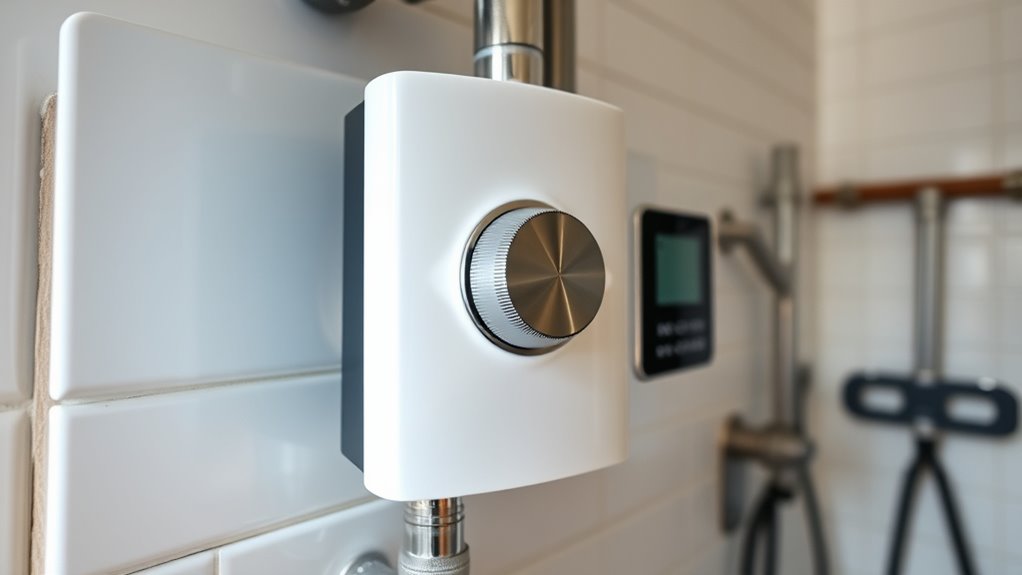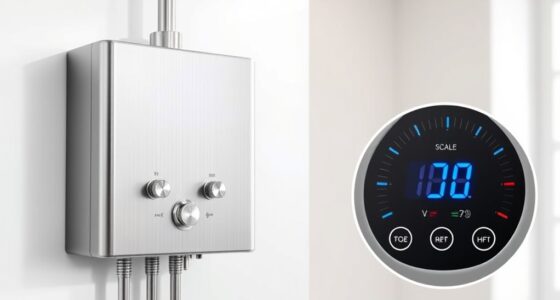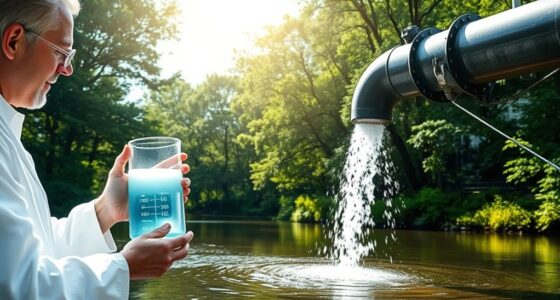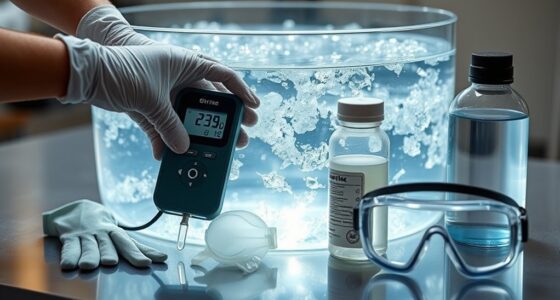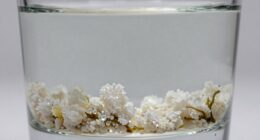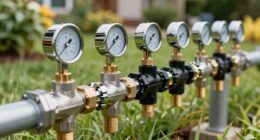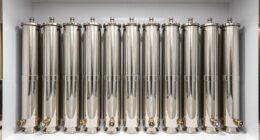Scale control helps keep your tankless heater running efficiently by preventing mineral buildup from hard water, which can cause clogs, reduced flow, and damage. Using methods like water softeners, scale inhibitors, and regular system maintenance can greatly extend your heater’s lifespan and save on energy costs. Recognizing signs of scale issues, such as strange noises or inconsistent hot water, allows you to act early. To keep your heater in top shape, explore more about effective scale management techniques.
Key Takeaways
- Scale control involves using inhibitors, reduction systems, or descaling agents to prevent mineral buildup in tankless heaters.
- Hard water contains calcium and magnesium minerals that can cause scale buildup, reducing heater efficiency and lifespan.
- Water softening techniques, like ion exchange, remove minerals to minimize scale formation and extend equipment life.
- Regular flushing and descaling help remove existing mineral deposits and prevent future scale-related issues.
- Signs of scale problems include reduced water flow, increased energy bills, and unusual noises, indicating the need for maintenance.
What Is Scale Control and Why Is It Important?
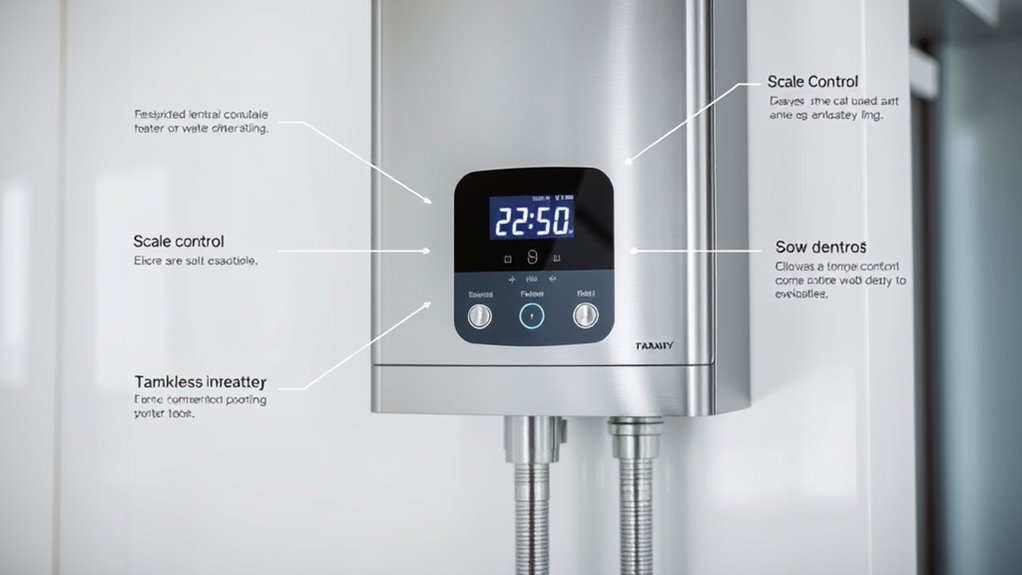
Scale buildup is a common problem that can considerably reduce the efficiency and lifespan of your tankless heater. Scale management involves handling mineral deposits to prevent these issues. Proper scale control helps maintain corrosion prevention by reducing mineral accumulation that can corrode internal parts. It also guarantees consistent water pressure, preventing blockages or reduced flow caused by mineral buildup. When scale forms, it acts as an insulator, making your heater work harder and wasting energy. Regular maintenance and using water treatment methods can help keep scale at bay. Implementing HEPA filters in your water system can further improve water quality and reduce mineral content. By controlling scale, you protect your heater’s components, keep water flowing smoothly, and extend its service life. Essentially, scale control is crucial for maintaining peak performance and avoiding costly repairs.
How Does Hard Water Affect Tankless Water Heaters?
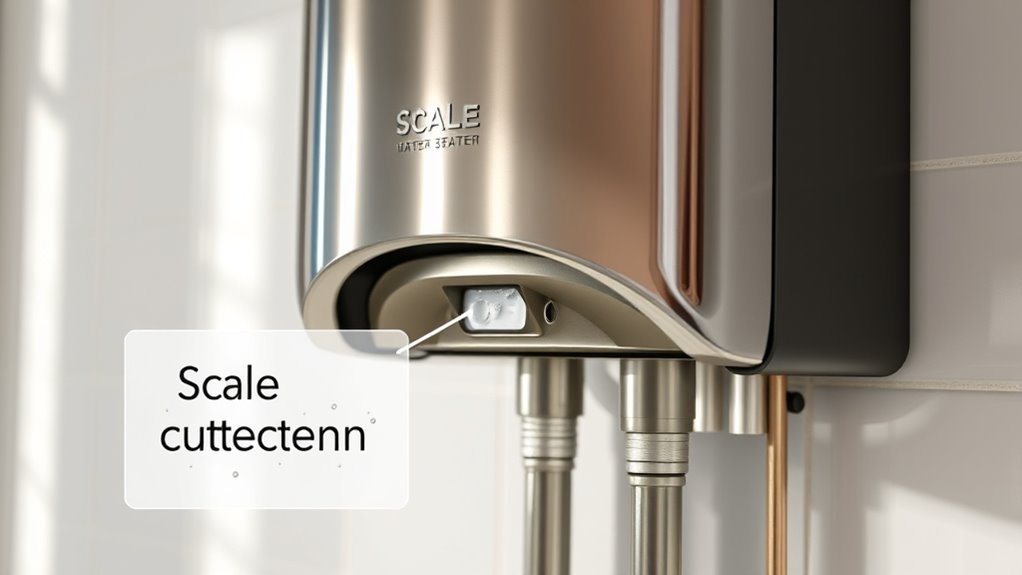
Hard water contains high levels of minerals like calcium and magnesium, which can quickly build up inside your tankless heater. This buildup affects the pH balance, making the water more alkaline and increasing the risk of corrosion. As minerals accumulate, they can cause clogs and reduce the heater’s efficiency, leading to higher energy costs and potential damage. Hard water also accelerates corrosion prevention issues, threatening the lifespan of your unit. Over time, mineral deposits can corrode internal components, resulting in leaks or failure. To protect your heater, it’s essential to monitor water hardness and implement treatment methods like water softening. Proper maintenance ensures Basics of Soaring and Gliding ideal pH balance, minimizes mineral buildup, and extends your tankless water heater’s performance and durability.
What Is Scale Buildup and How Does It Form?
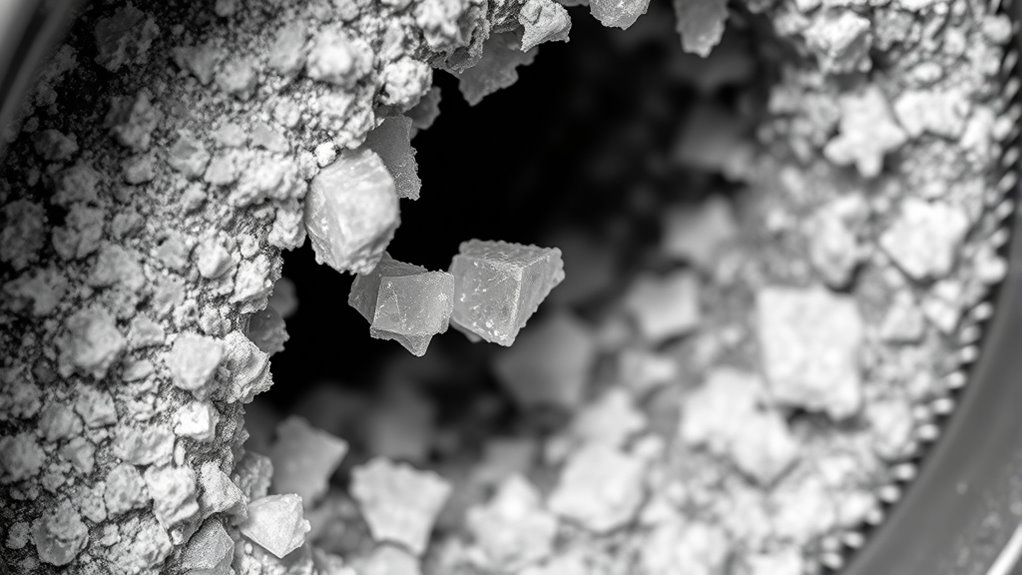
When mineral-rich water flows through your tankless heater, it leaves behind deposits that gradually accumulate on internal surfaces. This process creates scale buildup, primarily from calcium deposits formed during mineral accumulation. As water heats, calcium and other minerals become less soluble, settling out and sticking to the heat exchanger and pipes. Over time, these deposits grow thicker, reducing water flow and heat transfer efficiency. The mineral buildup can cause your heater to work harder, increasing energy costs and risking damage. The formation of scale is a slow process but becomes problematic if left unchecked. Understanding how calcium deposits develop helps you recognize the importance of maintenance and water treatment to prevent excessive mineral accumulation and extend your heater’s lifespan. Additionally, Gold IRA strategies highlight the importance of proper planning and upkeep to safeguard your investments against hidden issues.
What Are Scale Inhibitors and How Do They Work?
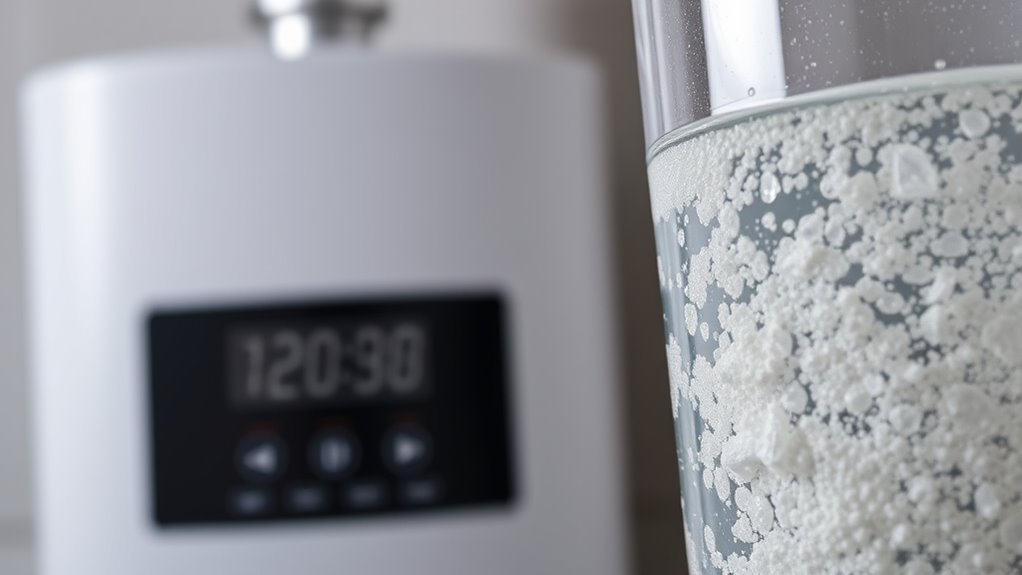
Mineral buildup can be a persistent problem in tankless heaters, but scale inhibitors offer an effective solution. These chemical agents prevent scale formation by interfering with mineral crystal growth, reducing deposits on heating elements. They also contribute to corrosion prevention by protecting metal surfaces from mineral-induced corrosion. When used with water filtration systems, scale inhibitors enhance overall water quality, making your heater more efficient. Here’s how they work:
- Bind to minerals like calcium and magnesium
- Disrupt crystal formation
- Minimize scale accumulation
- Extend your heater’s lifespan
- They can also help reduce the need for descaling maintenance, prolonging the lifespan of your unit.
What Is a Scale Reduction System?
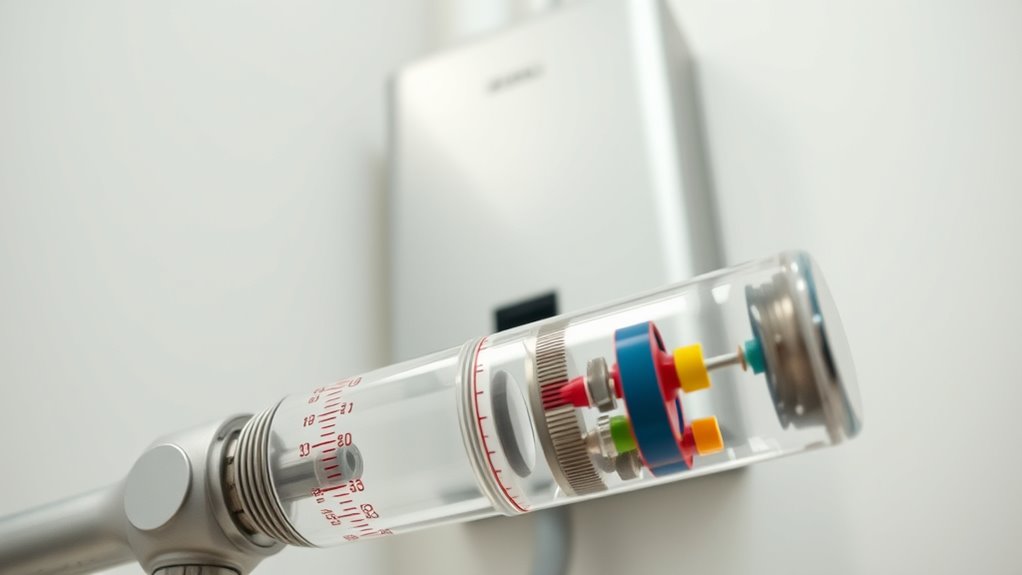
A scale reduction system helps prevent mineral buildup in your tankless heater, ensuring it runs smoothly. It works by using specialized technology to minimize scale formation, offering several key benefits like increased efficiency and longer equipment life. Installing one is straightforward and can save you time and money on repairs down the line. For optimal results, considering systems designed specifically for Kia Tuning components can enhance overall performance and durability.
How It Works
Ever wondered how a scale reduction system keeps your tankless heater running smoothly? It works by using flow sensors and temperature regulation to prevent mineral buildup. When water flows through, sensors detect changes in flow rate and temperature, signaling the system to activate. This process alters the water’s properties, reducing scale formation. Here’s how it works:
- Flow sensors monitor water movement, ensuring proper operation.
- Temperature regulation adjusts heating settings to prevent mineral deposits.
- The system introduces electrochemical signals that alter mineral behavior.
- These signals disrupt the formation of scale, extending the heater’s lifespan.
- Incorporating high contrast ratios in the system’s monitoring display enhances visibility and understanding of system performance.
Key Benefits
Implementing a scale reduction system offers several clear advantages for your tankless heater. It helps prevent corrosion by reducing mineral buildup that can damage internal components, extending the lifespan of your unit. Additionally, it boosts water heater efficiency by maintaining ideal heat transfer, ensuring you get hot water faster and use less energy. With less scale accumulation, your heater operates smoothly and reliably, reducing the risk of costly repairs or replacements. These systems also minimize maintenance needs, saving you time and money over the long term. Overall, a scale reduction system keeps your tankless water heater running at peak performance, providing consistent hot water while protecting your investment from the damaging effects of mineral deposits. Understanding the importance of scale control can help you make informed decisions about your water heater maintenance.
Installation Process
Installing a scale reduction system involves attaching specialized components to your tankless heater’s water supply line to minimize mineral buildup. This process enhances corrosion prevention and improves water filtration, extending your unit’s lifespan. Typically, you’ll install a scale inhibitor or a water softener that connects directly to your water line. During installation, guarantee all connections are secure and follow manufacturer instructions carefully. Proper setup reduces mineral deposits, protecting your heater from scale buildup.
- Verify compatibility with your water system
- Turn off water supply before installation
- Use appropriate fittings and tools
- Test for leaks after setup
How Do Descaling Agents Help Maintain Your Heater?

Descaling agents play a crucial role in keeping your tankless heater running efficiently by removing mineral buildup that can clog the system. By dissolving limescale and other deposits, these agents help prevent corrosion, which can damage internal components over time. Maintaining a clean heat exchanger with descaling agents ensures your heater operates at peak thermal efficiency, reducing energy consumption and prolonging its lifespan. Regular use of descaling solutions minimizes the risk of scale-related issues, keeping water flow smooth and heat transfer effective. This process also helps avoid costly repairs caused by mineral buildup. Additionally, proper maintenance of your heater includes monitoring for scale formation, which can impair performance and lead to system failure. Overall, descaling agents are essential for maintaining your heater’s performance, protecting it from corrosion, and ensuring consistent, energy-efficient hot water delivery.
What Is a Water Softener and How Does It Contribute to Scale Control?
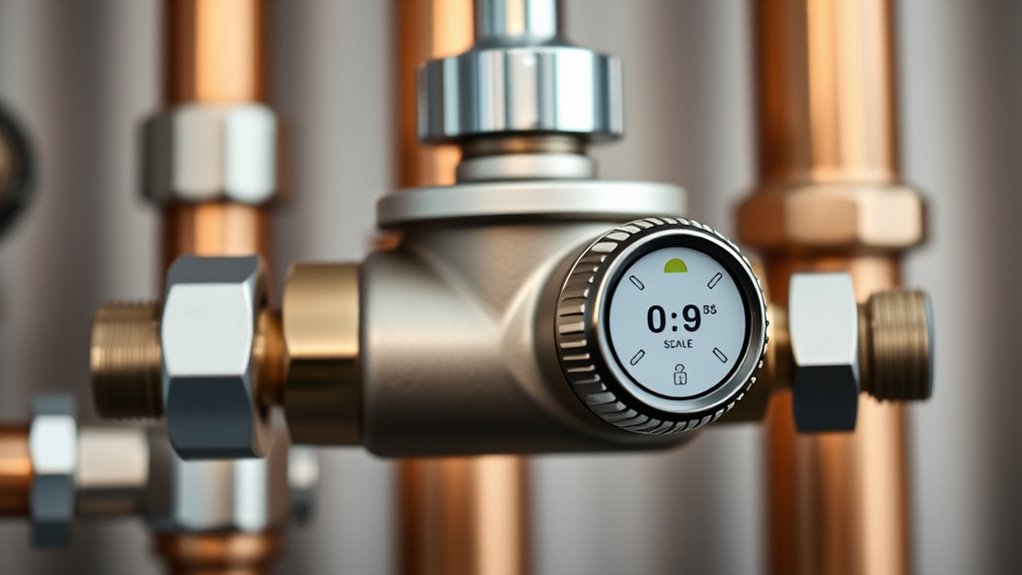
A water softener removes minerals like calcium and magnesium that cause scale buildup. By softening your water, it helps prevent deposits that can damage your heating system. This process improves efficiency and extends the lifespan of your tankless heater.
Softening Water’s Role
Understanding how water softeners work is key to controlling scale buildup in tankless heaters. They use water softening to remove minerals like calcium and magnesium that cause scale. This process prevents mineral buildup, reducing the risk of clogs and damage. When you soften water, you’re effectively:
- Reducing mineral content that leads to scale formation
- Improving heater efficiency and lifespan
- Lowering soap and detergent usage
- Minimizing maintenance needs
Mineral Removal Benefits
Water softeners remove minerals like calcium and magnesium from your water supply, directly addressing the root causes of scale buildup in tankless heaters. By reducing water mineralization, they lower the risk of scaling, which can impair performance and shorten equipment lifespan. Proper mineral removal promotes efficient heating and saves you money on repairs. Here’s a quick look at how softeners contribute:
| Mineral Type | Effect on Scale | Softener Role |
|---|---|---|
| Calcium | Hard scale formation | Removed through ion exchange |
| Magnesium | Similar to calcium | Removed through ion exchange |
| Other minerals | Less impact on scaling | Minimal or no removal |
This process enhances scaling prevention, ensuring your heater operates smoothly and efficiently. Additionally, understanding the water chemistry helps optimize the use of water softeners for maximum effectiveness.
Impact on Heating Systems
Since mineral buildup can hinder the efficiency of heating systems, a water softener plays a vital role in maintaining ideal performance. It reduces scale formation, which helps prevent corrosion and extends the lifespan of your equipment. By softening water, you improve efficiency optimization, ensuring your tankless heater operates smoothly and uses less energy.
A water softener contributes by:
- Minimizing mineral deposits that cause blockages
- Preventing corrosion of pipes and heating elements
- Enhancing heat transfer efficiency
- Reducing maintenance needs and downtime
Ultimately, softening water safeguards your system, keeps it running efficiently, and reduces costly repairs caused by scale buildup. It’s an essential component for maintaining optimal performance and longevity of your heating system.
How Can Regular Maintenance Prevent Scale Issues?
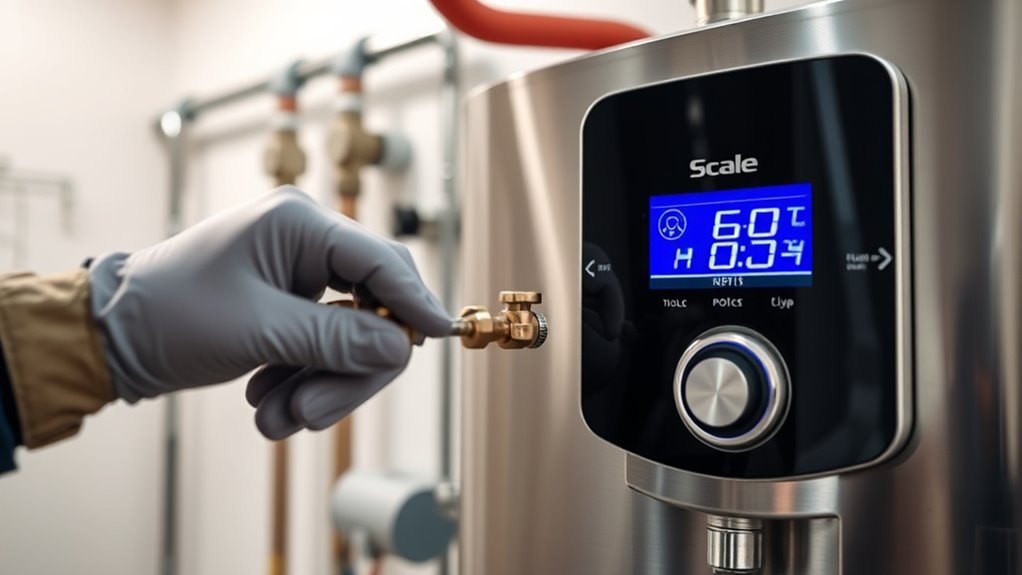
Regular maintenance plays an essential role in preventing scale buildup in tankless heaters. By scheduling regular inspections, you can identify early signs of mineral accumulation and address them before they cause issues. Proper water treatment, such as installing a water softener or descaler, is key to effective scale prevention. These systems reduce mineral content in your water, minimizing the risk of scale formation inside the heater. Flushing your unit periodically helps remove any existing deposits, keeping the heating elements efficient. Consistent maintenance not only prolongs the lifespan of your heater but also guarantees ideal performance. Implementing risk assessment strategies can further help you identify potential issues before they develop into costly repairs. Taking these steps helps you avoid costly repairs and reduces the likelihood of scale-related problems, keeping your hot water system running smoothly and efficiently.
What Are the Signs of Scale-Related Problems in Your Heater?
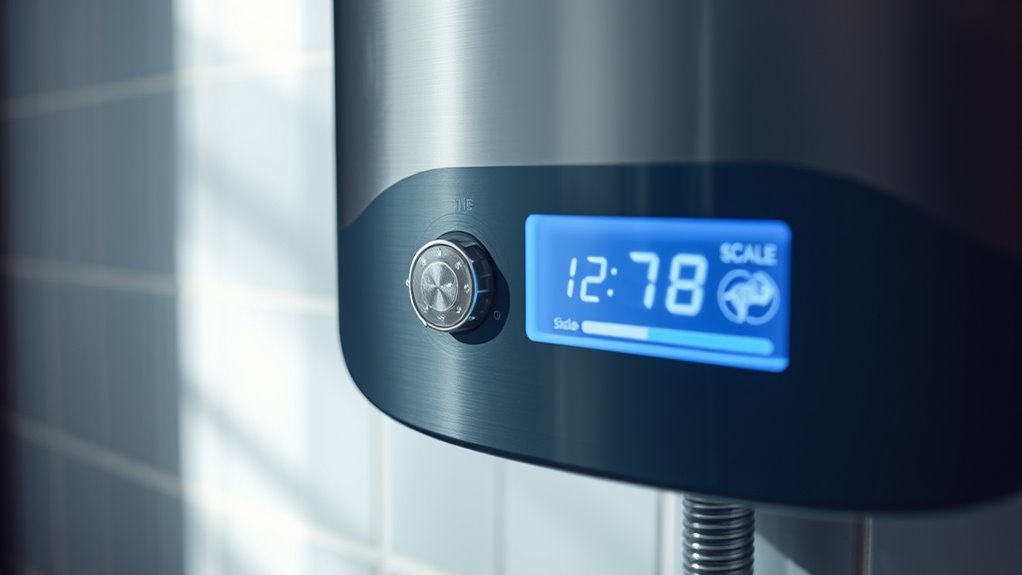
You might notice your water flow slowing down or your heater working harder than usual. Increased energy bills and strange noises or odors can also signal scale buildup. Recognizing these signs early helps you prevent costly damage and maintain efficient performance.
Reduced Water Flow Rate
Have you noticed your tankless heater isn’t supplying hot water as quickly as it used to? Reduced water flow rate is a common sign of scale buildup. As mineral deposits accumulate, they restrict water flow, affecting your heater’s flow rate and water pressure. You might observe:
- Slower hot water delivery
- Inconsistent water pressure
- Reduced flow in multiple fixtures
- Longer wait times for hot water
This decrease indicates scale is blocking the pathways inside your heater, making it harder for water to pass through efficiently. Over time, this buildup can cause the flow rate to drop even further, affecting overall performance. Addressing these signs early can prevent more significant issues and restore your heater’s proper function.
Increased Energy Usage
When mineral buildup causes reduced water flow, the heater works harder to deliver hot water, which leads to increased energy consumption. This decreased efficiency means your unit uses more power to heat water, raising your energy bills. Over time, scale buildup hampers the heater’s ability to operate smoothly, forcing it to exert more effort, which wastes energy. As a result, your heater becomes less energy-efficient, and you may notice higher utility costs. Additionally, increased energy usage impacts water conservation efforts because more resource input is required for heating. Recognizing this sign early can help you address the issue promptly, maintaining ideal heater performance. Regular maintenance and scale control help preserve energy efficiency, reduce unnecessary energy consumption, and support water conservation goals.
Unusual Noises or Odors
Unusual noises or odors coming from your tankless heater often signal scale-related issues. These sounds, like banging or hissing, can indicate mineral buildup affecting water flow and heating efficiency. Odors, especially sulfur-like smells, may result from corrosion or bacterial growth caused by scale accumulation. To address this, check your water temperature settings, as high temperatures can accelerate scale formation. Regular maintenance helps with corrosion prevention and keeps your heater running smoothly. Be alert to:
- Rumbling or banging sounds during operation
- Foul or sulfur-like odors
- Reduced water flow or inconsistent temperature
- Increased energy bills from inefficiency
Spotting these signs early can prevent damage and extend your heater’s lifespan. Proper scale control ensures your system remains quiet, efficient, and safe.
What Are the Best Practices for Long-Term Scale Management?
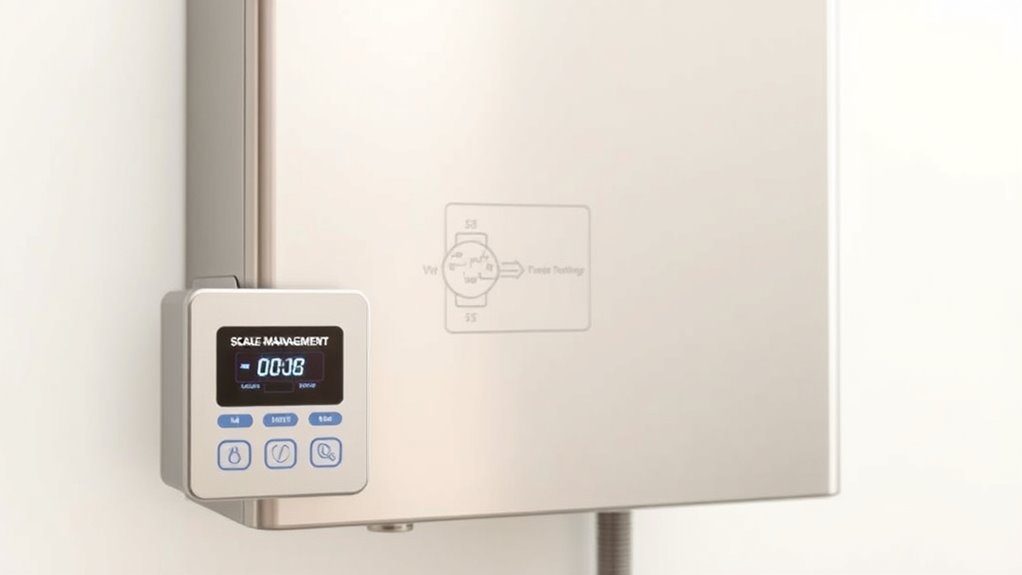
To effectively manage scale buildup in tankless heaters over the long term, implementing regular maintenance routines is essential. Start by using water filtration techniques to reduce mineral content, which helps prevent scale formation. Installing a dedicated water filter or softener can considerably lower calcium and magnesium levels, decreasing the risk of mineral deposits. Additionally, focus on corrosion prevention measures, such as inspecting anode rods and ensuring proper system flushing. Regularly flushing your heater with a descaling solution also helps remove existing scale and prevents future buildup. Combining these practices keeps your system running efficiently and extends its lifespan. Consistent maintenance not only minimizes costly repairs but also ensures your tankless heater delivers hot water reliably over time.
Frequently Asked Questions
Can Scale Control Systems Be Retrofitted to Existing Tankless Heaters?
Yes, you can retrofit scale control systems to existing tankless heaters. You should explore various retrofitting options, but keep compatibility concerns in mind. Not all systems work with every model, so check your heater’s specifications and consult the manufacturer or a professional installer. Proper installation guarantees the scale control system functions effectively, helping prevent mineral buildup and extending your heater’s lifespan.
What Are the Environmental Impacts of Using Scale Inhibitors?
Think of scale inhibitors as guardians protecting your system’s health. They minimize chemical effects that could harm your water quality and extend your heater’s lifespan. While they help conserve resources by reducing mineral buildup, they can also introduce chemicals into the environment. Using them responsibly balances resource conservation with environmental impacts, ensuring your system runs efficiently while safeguarding our planet. Always choose eco-friendly options and follow proper usage guidelines.
How Often Should Scale Control Systems Be Inspected or Replaced?
You should inspect your scale control system at least once a year to guarantee it’s functioning properly. Follow the replacement guidelines provided by the manufacturer, which typically recommend replacing the system every 3 to 5 years or when signs of wear appear. Regular inspections help prevent scale buildup, optimize heater performance, and extend its lifespan. Staying proactive with maintenance keeps your tankless heater running efficiently and avoids costly repairs.
Do All Water Sources Require Scale Control for Tankless Heaters?
Think of water sources as different kinds of soil—some rich in nutrients, others prone to clogging. Not all water sources need scale control, but if your water has high hardness levels, it’s like a magnet for mineral buildup that can damage your tankless heater. To keep it running smoothly, test your water’s hardness and consider scale control if mineral deposits become a concern, especially in hard water areas.
Are There DIY Methods for Maintaining Scale Control Effectiveness?
Yes, you can do DIY maintenance for scale control effectiveness. Regularly flush your tankless heater with vinegar or a chemical solution designed for descaling to prevent mineral buildup. These chemical solutions help dissolve scale and maintain efficiency. Just remember to follow the manufacturer’s instructions carefully, and wear protective gear. Performing this maintenance monthly or as recommended can extend your heater’s lifespan and guarantee peak performance without professional help.
Conclusion
So, next time your tankless heater’s acting up, don’t just sit there puzzled. Remember, hard water’s no friend, and scale is the sneaky villain. Keep those inhibitors handy, schedule regular check-ups, and embrace the soft water lifestyle. Because, let’s face it, a little scale control now means endless hot showers later—without the drama. Stay vigilant, stay warm, and keep that heater running smoother than a well-oiled machine. Cheers to hassle-free heating!
